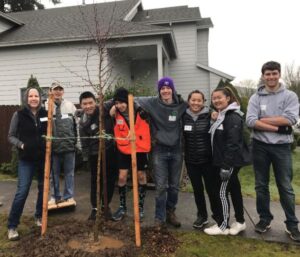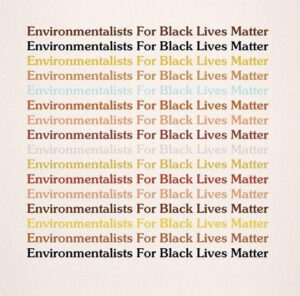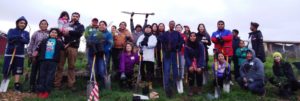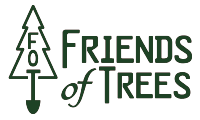Tag: environmental justice
Get to Know our partner, APANO

The Asian Pacific American Network of Oregon operates under the principal we are stronger together
APANO’s Policy Director Richa Poudyal talks about APANO’s goals for the Robert Wood Johnson Foundation project:
What is the #1 thing readers should know about APANO?
APANO envisions a just world where Asians and Pacific Islanders and communities who share our aspirations and struggles have the power, resources, and voice to determine our own futures, and where we work in solidarity to drive political, social, economic, and cultural change. For climate justice work, we are striving for BIPOC communities in Oregon to exercise self-determination to make decisions about how to move towards a more regenerative economy. We do this work in coalition and side by side with community members most impacted by the impacts of climate change.
Why is APANO involved in the Robert Wood Johnson Foundation project?
Within climate justice work, APANO is very interested in creating spaces and structure for place-based community organizing and advocacy. The RWJF project is such a special collaboration between Friends of Trees, PSU, and APANO; it’s collaborations like these that allow multiple organizations to contribute their respective strengths and power to support community members in achieving self determination around greening and localized climate justice work. APANO is so grateful to be a part of this project and to bring a community organizing lens and approach to greening outer East Portland, and to work with Friends of Trees which has the community connections, advocacy skills, and know-how around connecting to and planting trees as a part of a conservation and greening strategy.
What’s the community response to this project?
We are two months into our 12 month project, and are working with an incredible group of twelve community members who live in outer East Portland. Since the kick off of the project has coincided with the heat wave we’ve faced in Portland this year, much of the feedback so far has been around being glad to have a space to do something tangible and locally to actively tackle heat and air quality impacts of climate change that have already been prevalent for our neighbors in outer East Portland. Folks have also expressed gratitude to have the space to connect with others and grieve and process the changes in the land and air around us, mostly caused by humans.
What is the top result APANO would like to see from this project?
For APANO, the primary result that we want to see is community feeling empowered and resourced to both advocate for community-sourced solutions and to create and put forward solutions themselves, outside traditional decision-making institutions.
Thank you Richa! Learn more about APANO.
photo: APANO + Friends of Trees planting event in east Portland
Friends of Trees stands with our Black colleagues, partners, and community members

If you have come here to help me, you are wasting your time. But if you have come because your liberation is bound up with mine, then let us work together. -Lilla Watson
Friends,
Friends of Trees is incensed and stands in solidarity with the Black community. We add our voice to the many groups and institutions this week calling for justice for George Floyd, Breonna Taylor, Tony McDade, Ahmaud Aubrey, and too many others.
It is undisputed that Black, Indigenous, and all people of color bear a disproportionate impact of racial injustice and its deadly consequences. Environmental justice is among these systemic inequalities. FOT acknowledges that the Black community is more impacted by respiratory illnesses due to poor air quality making them more vulnerable. At Friends of Trees, we believe the benefits of trees should be experienced by everyone: clean air, clean water, and healthy communities are human rights. We heartily commit to listening to community needs as we work for an environmentally just future where Black folks can breathe freely.
Just as trees are connected via their root systems and intertwine underground with fungi to exchange nutrients, carbon, and water in order to survive and thrive, so too are our human communities connected. When white supremacy and police brutality affect some, it is a blight on us all. Just like a tree community’s root systems, the onus is on those with resources to combat the disease.
Friends of Trees is responding to the call for action and encourages you to join. Each and every one of us can use our voices to support the Black community. We urge you to get involved.
Onward,
Whitney Dorer, Interim Executive Director
Phoebe Krueger, Board Chair
Environmentalists For Black Lives Matter image by @greengirlleah
Get involved:
The Blueprint Foundation | The Black Parent Initiative | Black Lives Matter: PDX | Imagine Black | Equitable Giving Circle | The Black Resilience Fund | NAACP Portland | Eugene Springfield NAACP | Urban League of Portland | Coalition of Communities of Color | Momentum Alliance | Self Enhancement, Inc. | Campaign Zero | Don’t Shoot Portland | Black United Fund of Oregon
Partnering with Community Benefit Organizations to plant trees + grow community

“CBO partnerships are especially important for an environmental organization like Friends of Trees because they help us effectively reach low income communities and communities of color, communities that are impacted first and the most by climate change.” -Surabhi Mahajan, Friends of Trees’ Equity, Diversity, and Inclusion Specialist
Trees + community is so much more than volunteers planting trees together. True community means that a diverse population has access to all of the benefits of trees, especially historically underserved communities of color. And in order to reach diverse communities we need a diverse range of partnerships.
Friends of Trees is fortunate to enjoy some amazing partnerships, and some particularly amazing partnerships are with Community Benefit Organizations (CBOs). CBOs are community-based nonprofit organizations, are often culturally specific, and provide some sort of community benefit. An example in Portland is Verde, which among other services provides workforce training for the Latinx community.
Friends of Trees’ CBO partners include Verde, Wisdom of the Elders, Black Parent Initiative, the Blueprint Foundation, APANO, and POIC. Most of these organizations are partners in our Urban Forestry Training Program*, which helps connect adults to jobs in the Urban Forestry field (learn more about this program here). Beyond this joint endeavor our CBO partnerships take a few forms:
Verde and Wisdom of the Elders each support our tree planting work through planting event preparation, participation, and follow-up, including post-planting tree care. Verde also provides some contractor services at our Portland office on NE MLK Jr. Blvd (get to know more about Wisdom in the next story).
Black Parent Initiative is a community-based organization that serves Black families or families with Black children through home care visits, economic job opportunities, and other services. The FOT-BPI partnership supports connecting Black families in Portland to nature and to tree planting events, as well as connecting to job training programs in the urban forestry and restoration sector.
The Grounding Waters program of the Blueprint Foundation exposes Black urban youth to careers in environmental science, and paid workforce training with Friends of Trees is part of the program. Grounding Water youth train and participate in planting events as Crew Leaders; Grounding Waters youth will also train and participate as Summer Inspectors, checking on the health of trees planted through our Neighborhood Trees Program, which will provide additional learning opportunities. * Note: The Blueprint Foundation is not a current partner in the Urban Forestry Training program, but is considering the program.
Our partnership with the Asian Pacific American Network of Oregon (APANO) focuses on the Jade Greening Project, which is working to increase the canopy of East Portland’s Jade District. Friends of Trees’ involvement includes tree-planting events and targeted community outreach toward getting more trees planted and volunteers engaged. A new feature of this partnership includes our first intern from APANO, whose focus has been supporting planting events through securing food donations from diverse neighborhood businesses and joining the planting teams.
Our partnership with Rosemary Anderson High School’s Portland Opportunity Industrialization Center (POIC) involves hands-on job training and leadership skill-building with high school students. Each season 10-14 POIC students train to be Crew Leaders and they participate in planning and leading Friends of Trees planting events; the students receive stipends as part of this program. Read more about this partnership in our December 2016 edition of Treemail.
Our CBO partnerships provide countless benefits, to both Friends of Trees and to our community. When youth are able to experience leadership positions, and when diverse communities have access to training that leads to internships and jobs with green organizations, preconceived barriers about green jobs and environmental engagement start to break down. Further, the youth interns can serve as role models for other youth volunteers, particularly for young people of color who can be inspired when someone who looks like them has a leadership role.
These partnerships also have an environmental justice aspect. Many of our partners and interns serve or live in under-canopied areas that experience greater impacts from climate change, such as heat islands. Involvement with community tree planting provides a way for participants to address some environmental inequities firsthand.
Equitable partnerships represent a core value of Friends of Trees and are critical to true community building, and we strive toward fostering this type of partnership in the work we do. We are thankful to the support of the City of Portland’s Bureau of Environmental Services and East Multnomah Soil and Water Conservation District for support that helps make these partnerships possible.
Pictured above: Urban Forestry Training Program participants from project partners POIC, APANO, Wisdom of the Elders, Verde, the Black Parent Initiative, and the Pathways to Farming program.
This story is from the January 2020 edition of our e-news, Treemail; check out other issues of Treemail here.
